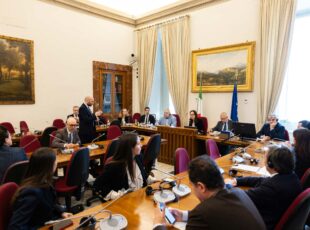A Lion of Human Rights
 On Wednesday in St. Petersburg, friends, family, and colleagues gathered to lay to rest and honor the memory of Yuri Schmidt (Yury Shmidt), a well regarded Russian human rights lawyer who died due to a cancer-related illness last weekend.
On Wednesday in St. Petersburg, friends, family, and colleagues gathered to lay to rest and honor the memory of Yuri Schmidt (Yury Shmidt), a well regarded Russian human rights lawyer who died due to a cancer-related illness last weekend.
The child of Soviet political prisoners, Schmidt was in many ways a living definition of the struggle for human rights in Russia, having been involved in many of the seminal cases of the past 20 years. Having grown up in difficult circumstances with dissident parents, Schmidt began practising criminal law in the 1960s, as he was forbidden to represent political prisoners because of his history. After the fall of the Soviet Union, he founded the Lawyers’ Committee for the Defense of Human Rights, and quickly became known as one of the most fearless, experienced lawyers on sensitive political matters.
Not only did Schmidt represent the family of the murdered lawmaker Galina Starovoitova, he was also a key member of the legal defence team for Mikhail Khodorkovsky, who commented upon his passing that Schmidt “supported me greatly – not only as a lawyer, but also as a human being.”
Over the course of his long career, one of Schmidt’s most famous victories was the acquittal of Alexander Nikitin, a former Navy submarine officer and environmental activist who blew the whistle on nuclear waste being illegally dumped in the sea by the Russian Northern Fleet. Nikitin, who was declared a Prisoner of Conscience by Amnesty International, was subjected to three years of investigation before being put on trial beginning in 1998. It was practically an impossible case for Schmidt, as Nikitin was accused under two secret military decrees that neither the defendants nor lawyers were even allowed to see, but nevertheless triumphed after 8 court proceedings, leading eventually to the presidium of the Russian Supreme Court, which finally cleared Nikitin of the espionage charges.
At the time, the acquittal was seen as a positive sign for the independence of the Russian judiciary. It would also become one of the last times that a court would stand up to pressure from the FSB.
“Yury Schmidt was probably Russia’s leading human rights lawyer and certainly the bravest,” said Jon Gauslaa, a Norwegian Ministry of Justice official who worked alongside him on the Nikitin case. “It was a privilege to have known him and to have worked with him. His passing is a great loss. He will be missed.”
The loss of Schmidt has prompted numerous reactions across Russia and beyond.
“Unfortunately, our time is unkind. And at this time the most important people are lawyers. And one of the best lawyer of this vile time is gone, he did not let time to win over him,” said Alexei Simonov, President of the Glasnost Defense Foundation.
Amnesty International Germany published a commemorative obituary of Schmidt, remarking that he was “an irreplaceable dialogue partner and long-time friend,” while pledging to continue their struggle for human rights in Russia in his name.
“He was inconvenient for the prosecution and for the system, which served for its own benefit and not for the person’s. However, he was a very reliable advocate for those whom he agreed to defend,” said former Duma Deputy Yuliy Rybakov.
Over the course of his advocacy on behalf of Khodorkovsky, Schmidt frequently visited European capitals where he met with a number of public figures and journalists.
The French philosopher Andre Glucksmann commented, “He was such a good man. We feel so sorry, but the words are too weak,” while Galia Ackerman, President of the French-Russian journalist association, remarked “He was an extraordinary man.”
In Germany, the German-Russian Exchange published a dedication to Schmidt, while in the United States, the NGO Human Rights Watch also commemorated his passing.
According to journalist Brian Whitmore of Radio Free Europe / Radio Liberty, Schmidt leaves behind a gap that will need to be filled.
“When I asked him if there was anybody among Russia’s young attorneys who impressed him, he said he had considered Stanislav Markelov, the rights lawyer who was assassinated in January 2009, to be his ‘spiritual successor’ and was deeply troubled by his death,” Whitmore writes. “‘There will be somebody,’ he said. ‘I don’t want to think the situation is so hopeless.'”



